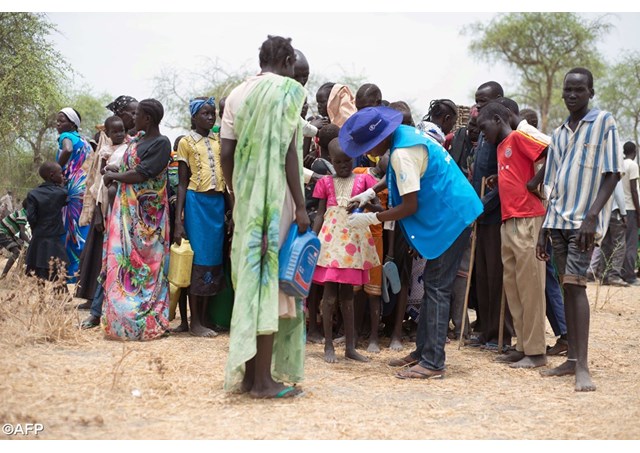
FAO airlifts supplies to farmers in South Sudan

(Vatican Radio) The United Nations’ Food and Agriculture Organization (FAO) is providing humanitarian relief to farmers in South Sudan as the spring planting season begins.
“For many farmers, this is the only opportunity to plant cereals this year,” said Serge Tissot, acting FAO Representative in South Sudan. “Without seeds now, they will have to wait another year to plant and that means they won't see another cereal harvest until the end of 2016.”
The FAO, in conjunction with other aid agencies, is flying supplies to vulnerable farmers in areas of the Upper Nile and Jonglei states. Tens of thousands of tonnes of materials have been flown to local airstrips.
The airlifts are part of a multi-faceted effort by relief agencies to assist millions of vulnerable people within South Sudan.
The FAO has made available their interview with Serge Tissot, the acting FAO representative in South Sudan:
(FAO) As the main planting season here begins, the UN's Food and Agriculture Organization (FAO) is accelerating its efforts to get vital seeds, tools and other materials to some of South Sudan's most vulnerable farmers.
With up to 18 flights loaded with seeds, tools and fishing kits leaving Juba each day, FAO is working to get these materials into farmers' hands in time for planting in conflict-hit areas of Upper Nile and Jonglei states, where hunger and malnutrition levels are particularly high. The airlifts are complementing land transportation in areas no longer reachable by truck.
In the last few days, almost 100 tonnes of inputs have been flown from Juba to local airstrips, representing just a portion of those destined to reach over 175,000 food-insecure farming families in Upper Nile, Unity and Jonglei by the end of May.
“For many farmers, this is the only opportunity to plant cereals this year,” said Serge Tissot, acting FAO Representative in South Sudan. “Without seeds now, they will have to wait another year to plant and that means they won't see another cereal harvest until the end of 2016.”
So far, just one flight was able to land in Unity state before the conflict forced partners and UN agencies to suspend activities. FAO is monitoring the situation and adapting its programme to rapidly meet the needs of thousands of vulnerable people, taking any opportunity to provide inputs in more secure areas.
The current wave of fighting comes at a crucial time for farmers who have depleted their food stocks and have only the next few weeks to plant their crops.
“We have a small window to provide farmers with the inputs they need to start planting,” added Karim Bah, FAO's Emergency Response Manager in South Sudan. “Given the massive quantities that have to be moved in a very short time, renewed insecurity in some areas and the start of rains, we have had to use the fastest means of transport - where trucks are no longer a viable option, airlifts have been the most appropriate alternative.”
FAO is collaborating with national and international NGOs based in the target regions to distribute the airlifted materials on the ground.
| All the contents on this site are copyrighted ©. |


